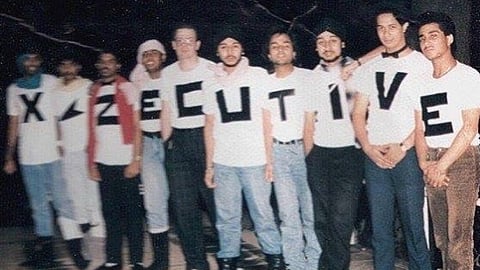
- HOMEGROWN WORLD
- #HGCREATORS
- #HGEXPLORE
- #HGVOICES
- #HGSHOP
- CAREERS
- ABOUT US
- CONTACT US

In the mid-1980s, as hip-hop began to ripple across the Atlantic and take root in Britain, South Asian youth in West London found themselves part of an unlikely revolution. The boroughs of Hayes, Southall, and Uxbridge were more often associated with immigrant struggle and industrial decline than with the pioneering of cultural movements. Yet in community halls, college campuses, and makeshift venues, young DJs, MCs, and breakdancers were creating a vibrant local scene that fused imported vinyl from New York with the restless energy of a new generation of British Asians.
Among the earliest collectives to emerge were the Circuit Breakers, a breakdancing crew established in 1983, and their offshoot, the Circuit Crew. Comprised of brothers Pali and Lakhi Singh, alongside friends and collaborators like DJ Sanj (performing under the roadshow crew name Xzekutive), the scratcher Argysabh, and MC Naz, these crews carved out a space in which hip-hop could be translated into the idioms of suburban West London life. Their routines combined the acrobatic flair of breaking with the resourcefulness of youths who scoured record shops for 12-inch imports, often bought on tight budgets and shared among friends.
For these young performers, hip-hop was a way of negotiating identity at a time when racism and exclusion were rampant in British society. South Asian kids were rarely seen on mainstream stages, but in the cipher or on the dancefloor, they could claim visibility and respect. Theirs was a scene born in community centres like The Grange in Hayes, where dance battles and DJ sets created moments of defiance and joy.
The importance of this cultural ferment was also recognized by television. Channel 4’s programme, 'Chasing Rainbows', produced by Mentorn Films, documented aspects of the community, capturing performances from the Circuit Breakers and their peers. Broadcast nationally, it offered a rare window into a subculture that would otherwise have remained confined to word-of-mouth memory. Today, that footage stands as one of the few surviving records of a scene that deserves a place in the broader history of British hip-hop.
Though their names never reached the charts, the Circuit Breakers and their contemporaries remind us that hip-hop in Britain was never limited to inner-city ghettos or to African-Caribbean youth alone. In the dance crews and DJ collectives of Hayes and Southall, South Asian teenagers were laying down their own foundations, chasing not just rainbows but recognition, self-expression, and the possibility of belonging.
Watch 'Chasing Rainbows' here.
If you enjoyed reading this here's more from Homegrown:
'Suno Re Kissa': In 1991, Manoj Bajpayee & Piyush Mishra Took Satire To Prime Time
Documentary 'The World Before Her' Confronts The Illusion Of Choice In Women’s Lives
Mani Kaul's 'Mati Manas' Tells The Story Of Humanity Through The Craft Of Pottery
